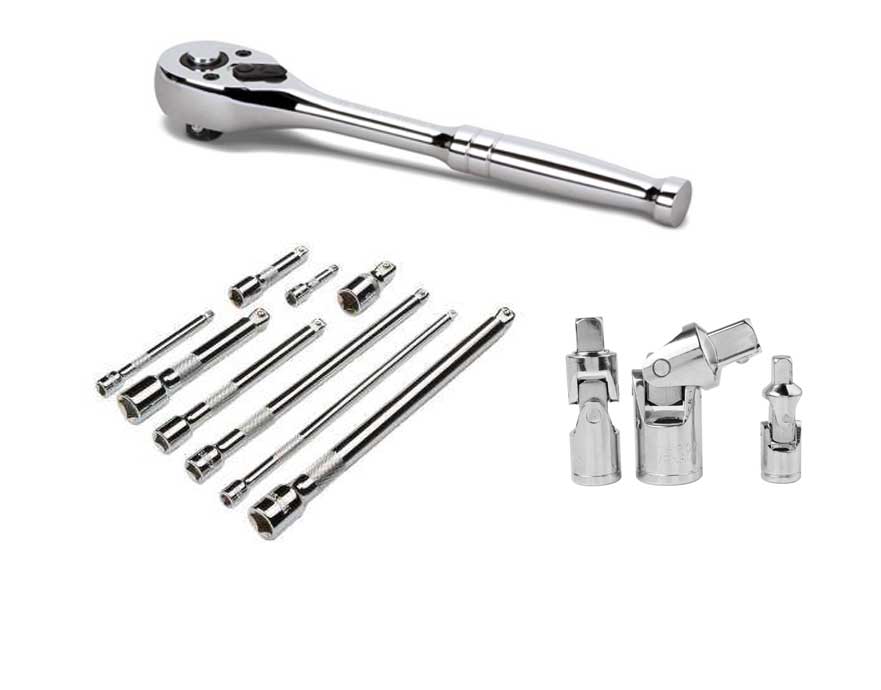<li><strong>Time-saving</strong>: When your tools are properly organized, you can easily locate the right tool for the job without wasting precious time searching through clutter. This allows you to complete tasks faster and take on more projects.</li>
<li><strong>Efficiency</strong>: With an organized tool collection, you can optimize your workflow by arranging tools in a logical order. This means you won't have to backtrack or interrupt your work to find the tools you need, resulting in a smoother and more efficient process.</li>
<li><strong>Safety</strong>: A cluttered workspace can be dangerous, increasing the risk of accidents and injuries. By keeping your tools organized and stored properly, you can minimize the risk of tripping over tools or having them fall and cause harm.</li>
<li><strong>Lack of space</strong>: Many mechanics work in small garages or workshops where space is limited. This can make it challenging to find suitable storage solutions that fit within the available space.</li>
<li><strong>Tool visibility</strong>: When tools are stored haphazardly or in opaque containers, it can be difficult to see what tools you have at a glance. This leads to wasted time searching for specific tools and increases the likelihood of tools being misplaced or forgotten.</li>
<li><strong>Tool protection</strong>: Mechanic tools are often quite expensive, and proper storage is essential for protecting them from damage, rust, or theft. Without adequate storage solutions, tools can become damaged or lost, resulting in unnecessary expenses.</li>
<li><strong>Ample storage</strong>: Tool chests and cabinets provide plenty of storage space, making them suitable for mechanics with large tool collections.</li>
<li><strong>Secure storage</strong>: Most tool chests and cabinets come with locking mechanisms, ensuring that your tools are safe and protected from theft.</li>
<li><strong>Easy organization</strong>: With multiple drawers and compartments, you can easily separate and categorize your tools, making them readily accessible when needed.</li>
<li><strong>Limited mobility</strong>: Tool chests and cabinets can be heavy and cumbersome to move around. If you frequently work in different locations, this may not be the most convenient option.</li>
<li><strong>Space requirements</strong>: Tool chests and cabinets require a dedicated space in your garage or workshop. If you have limited space, they may not be the most practical choice.</li>
<li><strong>Visibility</strong>: With tools displayed on a pegboard or rack, you can quickly see what tools you have and easily grab the ones you need, reducing search time.</li>
<li><strong>Space-saving</strong>: Pegboards and tool racks utilize vertical wall space, making them ideal for small garages or workshops where floor space is limited.</li>
<li><strong>Customizable</strong>: You can arrange hooks and clips on the pegboard or rack to suit your tool collection's specific needs, maximizing storage efficiency.</li>
<li><strong>Limited capacity</strong>: Pegboards and tool racks may not be suitable for large tool collections as they have a limited number of available hooks or clips.</li>
<li><strong>Dust accumulation</strong>: Tools displayed on open pegboards or racks are more prone to dust accumulation. Regular cleaning and maintenance are necessary to keep your tools in top condition.</li>
<li><strong>Portability</strong>: Tool bags and toolboxes are designed for easy transport, allowing you to bring your tools wherever your work takes you.</li>
<li><strong>Compact storage</strong>: These options are ideal for mechanics with a limited number of essential tools, as they provide a compact and organized storage solution.</li>
<li><strong>Protection</strong>: Tool bags and toolboxes often come with padding or compartments, providing protection against damage and ensuring that tools stay in place during transportation.</li>
<li><strong>Limited capacity</strong>: Tool bags and toolboxes have limited storage space, which may not be sufficient for mechanics with a large tool collection.</li>
<li><strong>Limited organization</strong>: While tool bags and toolboxes offer some organization, it can be challenging to keep tools separated and easily accessible. Smaller tools may get mixed up or buried underneath larger ones.</li>
<li><strong>Flexible configuration</strong>: Wall-mounted storage systems can be customized to fit your specific tool collection and available wall space. You can easily add or remove shelves, cabinets, or hooks as needed.</li>
<li><strong>Optimized space utilization</strong>: By utilizing vertical wall space, you can maximize your storage capacity and free up valuable floor space in your garage or workshop.</li>
<li><strong>Versatility</strong>: Wall-mounted storage systems can accommodate a wide range of tools, from small handheld tools to larger power tools, ensuring that your entire collection is organized and easily accessible.</li>
<li><strong>Installation requirements</strong>: Wall-mounted storage systems typically require installation, which may require some handyman skills or professional assistance.</li>
<li><strong>Cost</strong>: Depending on the brand and materials used, wall-mounted storage systems can be more expensive compared to other storage options. However, the long-term benefits may outweigh the initial investment.</li>
<li><strong>Socket organizers</strong>: Socket organizers come in various designs, including trays, rails, or magnetic holders, to keep your sockets organized and easily visible.</li>
<li><strong>Wrench racks</strong>: Wrench racks provide a convenient way to store and organize your wrenches, ensuring that they are readily accessible and preventing them from getting misplaced or damaged.</li>
<li><strong>Screwdriver holders</strong>: Screwdriver holders are available in different styles, such as wall-mounted racks or magnetic strips, allowing you to keep your screwdrivers neatly organized.</li>
<li><strong>Label everything</strong>: Use labels or markers to identify the contents of drawers, shelves, or bins. This makes it easier to find specific tools and ensures that they are returned to their designated storage spot.</li>
<li><strong>Implement a tool tracking system</strong>: Consider using a tool tracking system, such as a digital inventory or barcode system, to keep track of your tools. This helps prevent tools from being misplaced or borrowed without your knowledge.</li>
<li><strong>Regularly clean and inspect tools</strong>: Regularly clean your tools to remove dirt, grease, and debris. Inspect them for any signs of damage or wear and tear. Cleaning and maintaining your tools not only prolong their lifespan but also makes them easier to store and use.</li>
<li><strong>Group similar tools together</strong>: Grouping similar tools together based on type or function can make it easier to locate specific tools and maintain organization within your storage system.</li>
<li><strong>Regularly reassess and declutter</strong>: Periodically reassess your tool collection and remove any tools that are no longer needed or in good condition. This helps prevent clutter and ensures that you only keep the tools you actually use.</li>


Follow us on social media